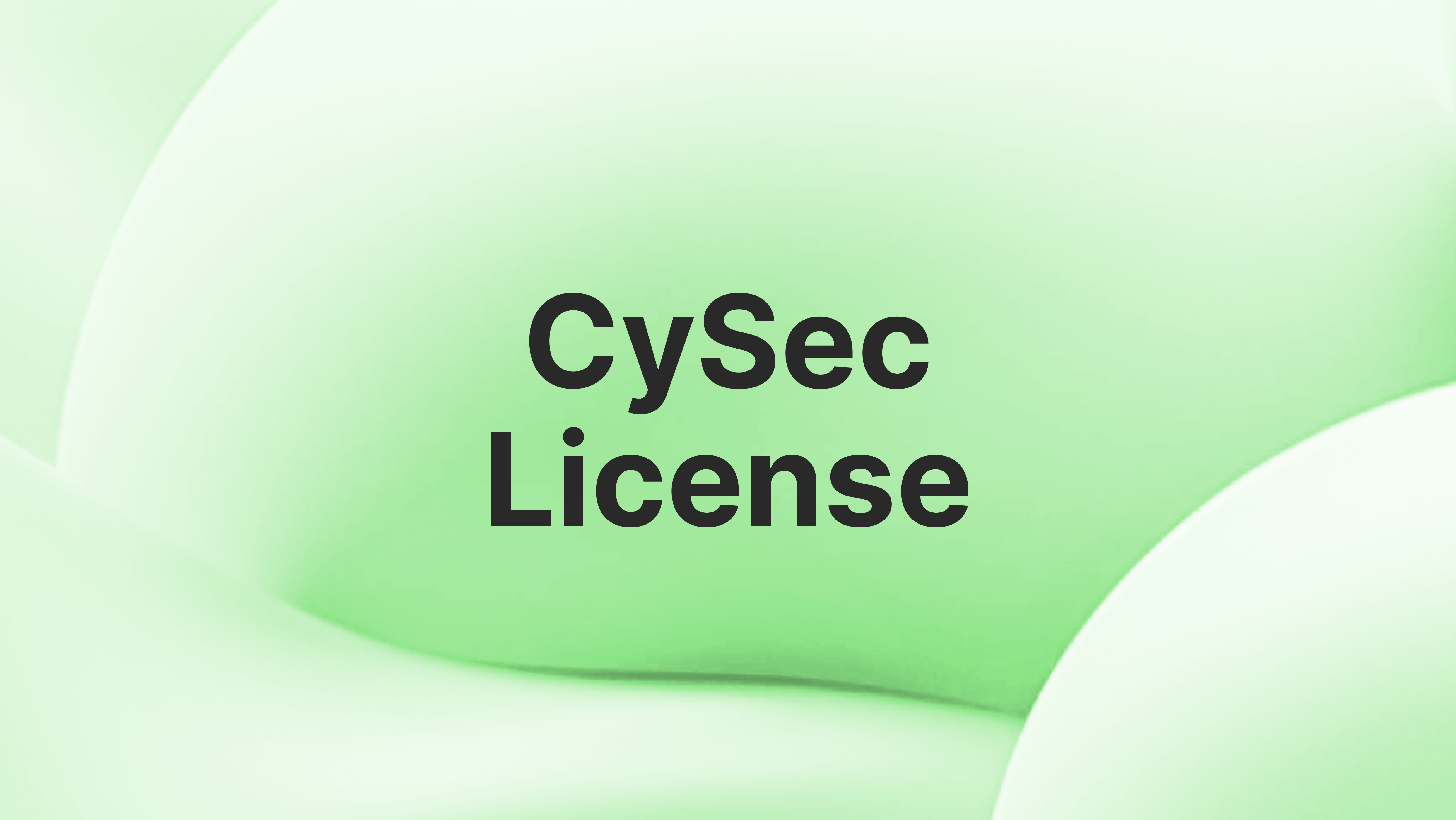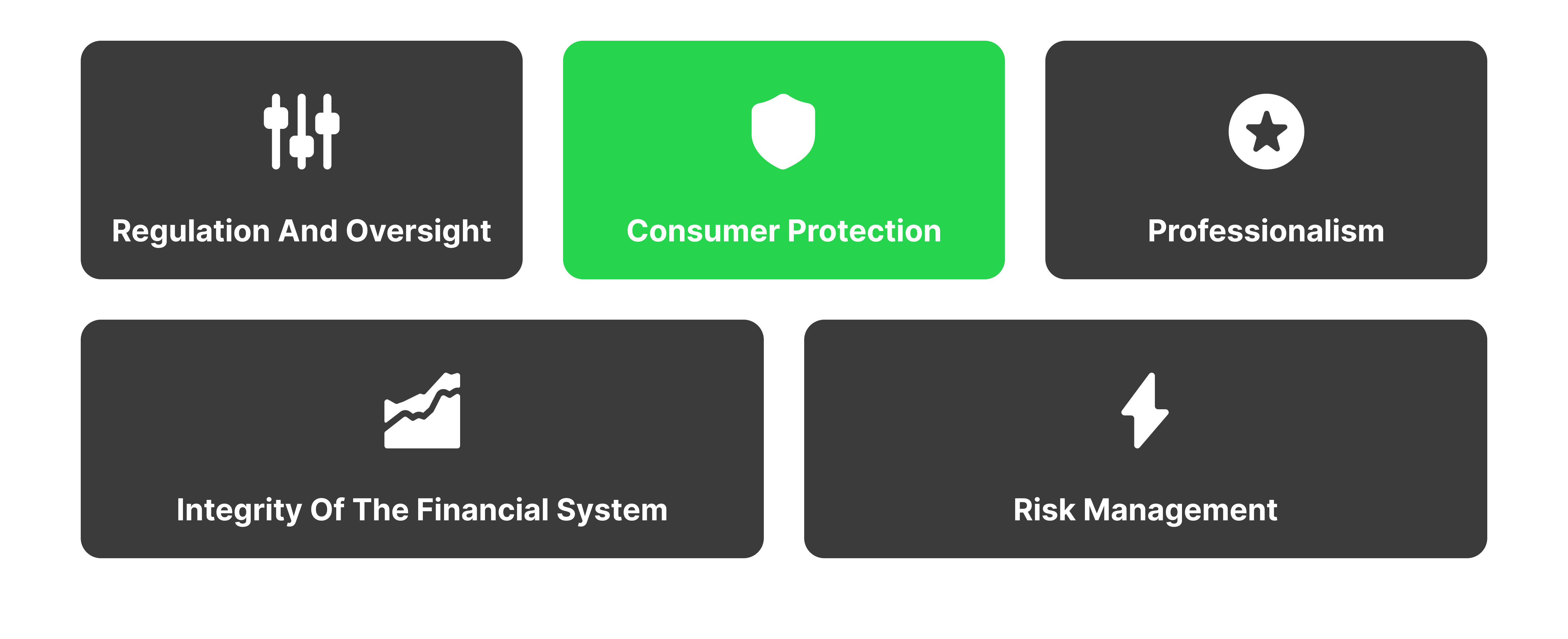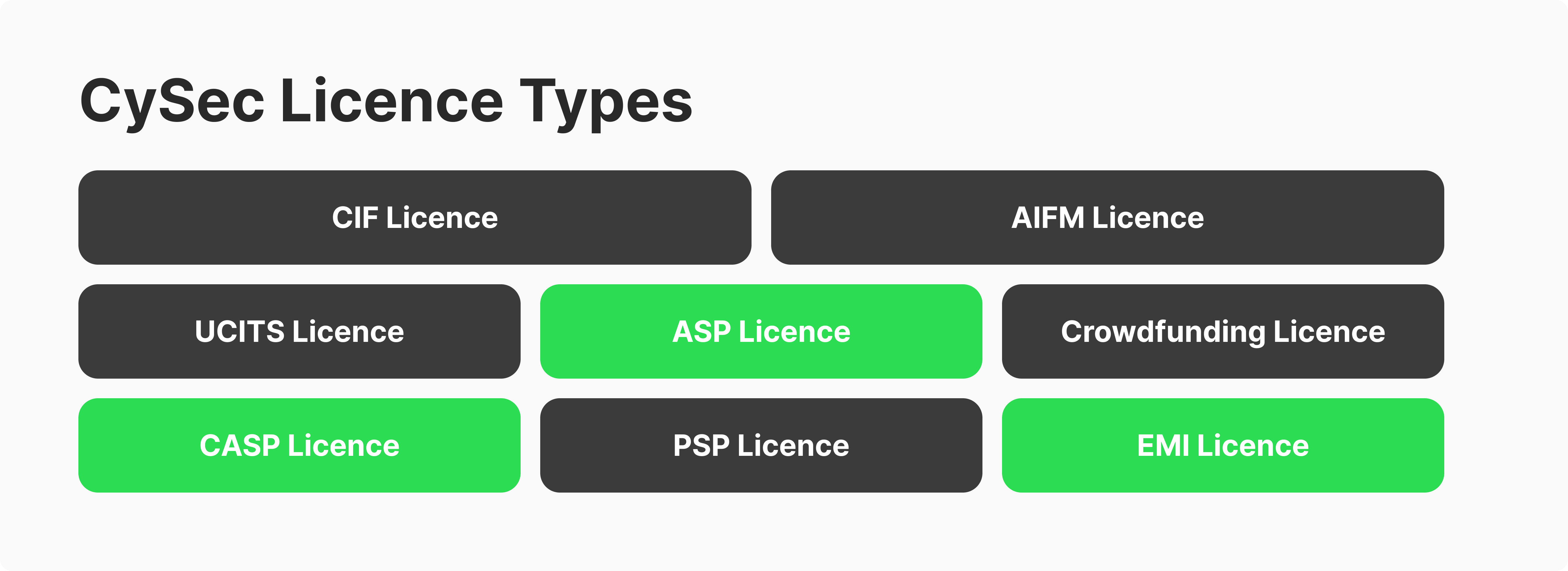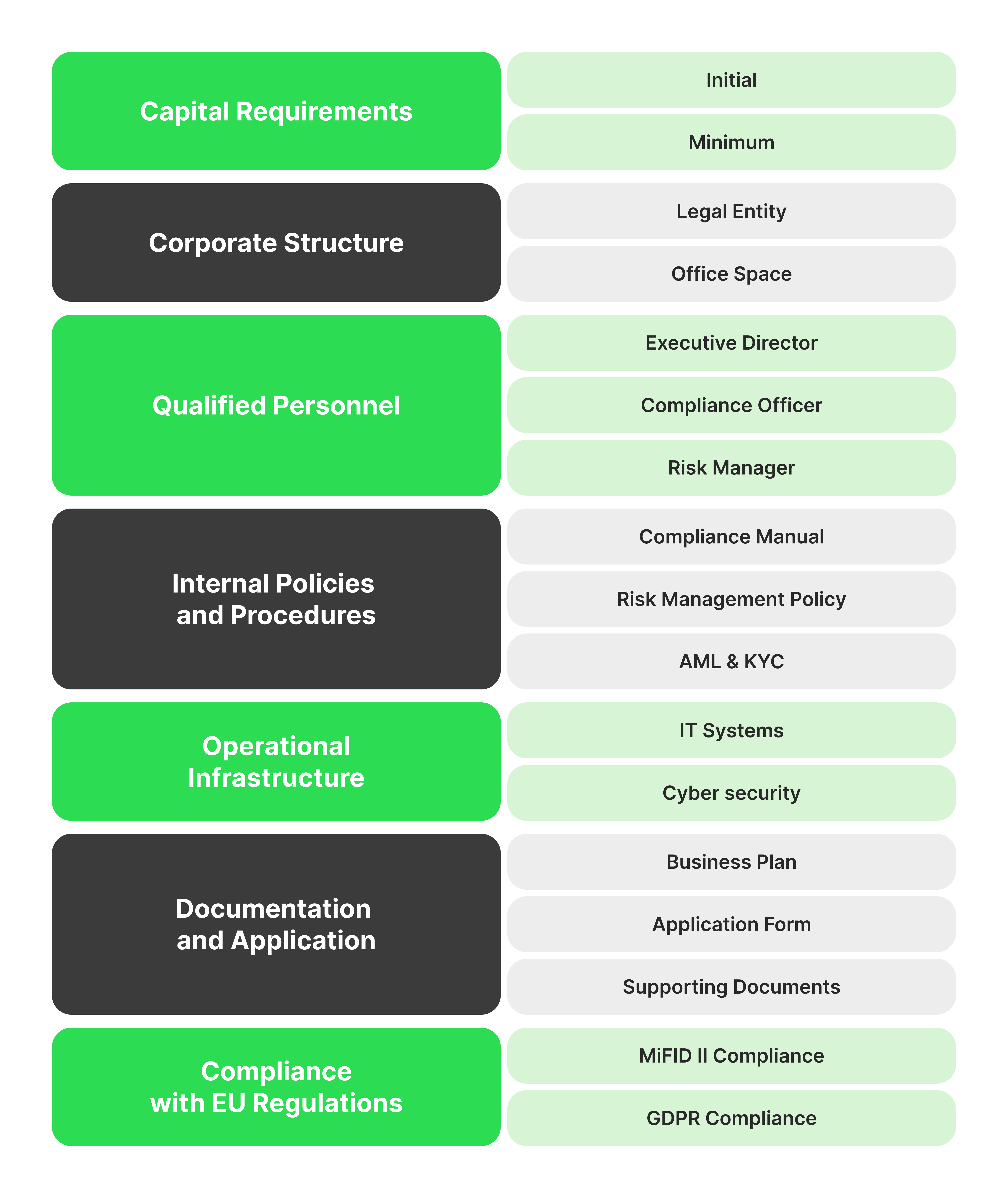How to Get a CySec Licence as a Broker

With a Bachelor's Degree in International Journalism, my career has taken me through diverse industries. I began in the banking sector, gaining valuable insights into finance over five years. This foundation led me to fintech, where I began to merge my financial understanding with my passion for writing. As a copywriter, I use my diverse experience to create content that's easy to understand and engaging, helping readers feel confident and informed about financial matters.
Tamta is a content writer based in Georgia with five years of experience covering global financial and crypto markets for news outlets, blockchain companies, and crypto businesses. With a background in higher education and a personal interest in crypto investing, she specializes in breaking down complex concepts into easy-to-understand information for new crypto investors. Tamta's writing is both professional and relatable, ensuring her readers gain valuable insight and knowledge.

In today's reality, doing business is practically impossible without the relevant permits and licences. It doesn't matter in which field you operate; if you claim professionalism, you must prove it to your customers with appropriate documents. Of course, one of the advanced areas in this regard is finance, where operating without the appropriate licences and permits is impossible.
A CySec licence, issued by the Cyprus Securities and Exchange Commission (CySec), is a gateway for brokers to operate within the European market. This Forex licence not only legitimises a broker's operations but also instils confidence among clients, knowing that the Forex broker adheres to stringent regulatory standards.
In this article, we will explore what a CySec licence is, the requirements for obtaining one, and the costs involved.
A CySec licence, issued by the Cyprus Securities and Exchange Commission (CySec), is a European licence that allows Forex brokers to operate across the European Economic Area (EEA).
Obtaining a CySec licence involves establishing a Cyprus Investment Firm (CIF), meeting capital adequacy requirements, and complying with MiFID II regulations.
The application process includes submitting a detailed business plan, financial statements, and proof of responsible individuals.
CySec licencing ensures a high level of investor protection and market integrity and strengthens your brokerage's reputation in the European market.
Before exploring one of the outstanding licences in the brokerage field, let's first define why brokers should consider acquiring the licence. There are several key reasons, primarily related to regulation, consumer protection, and maintaining the financial system's integrity. Here are the primary purposes:

Licencing ensures that brokers comply with the financial industry's laws and regulations. It also helps regulatory bodies monitor and enforce industry standards. Additionally, a licence sets a standard for entry into the market, ensuring that all brokers have the relevant knowledge and competence.
A licence assures consumers that the broker has met specific qualifications and adheres to ethical standards, which helps build trust and confidence in the broker's services. Additionally, licenced brokers are subject to oversight by regulatory bodies, providing consumers with options for recourse in case of disputes or malpractice.
Licencing helps prevent fraud and malpractice by ensuring that brokers undergo background checks and adhere to strict ethical guidelines. Furthermore, licencing contributes to the stability and integrity of financial markets by ensuring that only qualified individuals can operate as brokers.
Licencing often requires brokers to engage in continuing education, ensuring they stay up-to-date with industry changes, new regulations, and best practices. Besides, licenced brokers must follow a code of ethics which promotes professionalism and fair dealings in the industry.
Brokers often deal with complex financial transactions. A licence ensures they have the necessary expertise to manage these transactions efficiently and effectively, minimising risk to themselves and their clients.
In essence, the licencing of brokers is designed to protect consumers, maintain high standards in the financial industry, and ensure the smooth functioning of financial markets.
The Cyprus Securities and Exchange Commission (CySec) is Cyprus' financial regulatory body, overseeing investment firms and stock exchanges within the country. A CySec licence, formally known as a Cyprus Investment Firm (CIF) authorisation, empowers regulated brokers to operate legally across the European Economic Area (EEA).
The EEA is comprised of 30 European countries, including powerhouses like Germany, France, and Italy. Holding a Cyprus licence grants your brokerage firm the right to passport its services throughout this vast and lucrative market.
Brokerage firms offering trading services in financial instruments such as stocks, bonds, Forex, and derivatives.
Investment firms providing investment advice, portfolio management, and related services.
Fund Managers managing investment funds and collective investment schemes.
CySEC offers different types of licences tailored to various financial services and activities. Here are the primary types of CySEC licences:

The Cyprus Investment Firm (CIF) licence is the most common CySEC licence, enabling firms to offer various investment services and activities.
CySec offers two main CIF authorisation types for Forex brokers:
CIF 1: This licence permits your brokerage to provide investment services and receive and transmit client orders. It encompasses activities like currency exchange, execution of client orders on behalf of other investment firms, and portfolio management.
CIF 2: A CIF 2 licence grants broader authorisation, enabling your brokerage to deal on its own account (proprietary trading) in addition to the activities permitted under CIF 1.
Reception and transmission of orders
Execution of orders on behalf of clients
Dealing on own account
Portfolio management
Investment advice
Underwriting of financial instruments and/or placing of financial instruments on a firm commitment basis
Placing of financial instruments without a firm commitment basis
Operation of Multilateral Trading Facility (MTF)
Entities: Brokerage firms, trading platforms, asset management firms.
This licence is for firms managing Alternative Investment Funds (AIFs), which include hedge funds, private equity funds, and real estate funds.
Portfolio management of AIFs
Risk management
Marketing of AIFs
Administration of AIFs
Entities: Hedge fund managers, private equity firms, venture capital firms.
This licence is for firms managing UCITS, which are investment funds regulated at the EU level and can be marketed across the EU.
Management of UCITS funds
Administration of UCITS funds
Distribution and marketing of UCITS funds
Entities: Mutual fund managers, investment fund companies.

This licence is for firms providing a range of administrative services, typically excluding core Cyprus investment services.
Company formation and management
Accounting and bookkeeping
Custody of financial instruments
Safe custody services
Entities: Corporate service providers, fiduciary services firms.
This is a specialised licence for platforms facilitating crowdfunding activities.
Operation of crowdfunding platforms
Facilitation of investment-based or lending-based crowdfunding
Entities: Crowdfunding platforms and fintech companies specialising in crowdfunding.
Although not a traditional licence, firms dealing in crypto assets must register with CySEC to comply with anti-money laundering (AML) regulations.
Exchange services between crypto-assets and fiat currencies
Exchange services between crypto-assets
Custody and administration of crypto-assets
Entities: Cryptocurrency exchanges, wallet providers.
These licences are for firms providing payment services or issuing electronic money.
Payment processing services
Issuing of electronic money
Money remittance
Entities: Payment processors, e-money issuers, fintech companies.
Each type of CySEC licence is tailored to specific financial activities and regulatory requirements. Firms must choose the appropriate licence based on their business model and the services they intend to provide. Compliance with CySEC's stringent regulatory standards is crucial for obtaining and maintaining these licences.
Fast Fact
Forex businesses can use the standard, or Market Making, licence (minimum authorised capital—125,000 EUR) by passing orders directly to the liquidity pool rather than dealing directly with customers; the licencee is allowed to hold clients' money or other financial instruments using Straight-Through Processing (STP).

Obtaining a Cyprus broker licence involves meeting stringent regulatory requirements to ensure that the firm operates with integrity, transparency, and financial stability.
Here are the detailed requirements:
Firms must demonstrate sufficient initial capital. For example, a market maker might need a minimum of €725,000, while other types of brokers may require less. Minimum capital is also required, which depends on the type of services provided. For example:
€200,000 for firms providing investment advice or portfolio management services.
€730,000 for firms engaging in more complex activities such as dealing on their own account or underwriting.
The firm must be registered as a legal entity in Cyprus, typically a Limited Liability Company (LLC). Also, the firm must have a physical office in Cyprus where it conducts its core activities.
The company should have at least two executive directors and two non-executive directors with relevant experience and qualifications, a dedicated compliance officer responsible for ensuring adherence to regulatory requirements, and a risk manager who will be focused on implementing risk control measures.
These individuals will undergo a 'fit and proper' assessment by CySec to ensure they possess the necessary expertise and integrity.
You will be required to provide a comprehensive manual that details your firm's compliance policies and procedures. Additionally, you must establish and document a risk management policy that outlines the procedures for identifying, assessing, and managing risks. Finally, your firm must comply with AML policies in accordance with EU regulations, including customer due diligence (CDD) and suspicious activity reporting.
You must demonstrate a robust operational infrastructure, encompassing a secure and efficient IT framework for trading, data management, customer interaction, and cybersecurity measures. This infrastructure should effectively protect against cyber threats and ensure data privacy.
A detailed Forex business plan outlining the firm's strategy, market analysis, financial projections, and operational structure is also needed, together with the completed application form provided by CySEC. Some additional documents you will need are:
Articles of Association
Proof of capital
Personal information and CVs of directors and key personnel
Internal policies and procedures
Ensuring compliance with both MiFID II and GDPR is also required for your firm. MiFID II governs investment services across the EU, requiring adherence to its regulations. Simultaneously, the General Data Protection Regulation (GDPR) mandates robust data protection and privacy measures. Together, these regulations ensure that your firm meets the highest standards for both financial services and data privacy.

The application process for obtaining a CySEC licence is comprehensive and involves several steps to ensure that the applicant firm meets all regulatory requirements. Here is a detailed overview of the process:
Assemble a team with expertise in CySec regulations, financial services law, and compliance. This team will guide you through the application process and ensure adherence to all requirements.
Establish your legal entity in Cyprus. Secure a registered office address and appoint directors with the necessary qualifications and experience.
Prepare a comprehensive application package containing the following documents:
Completed CySec application form
Business plan outlining your brokerage's strategy and operations
Financial statements demonstrating sufficient capital adequacy
KYC (Know Your Customer) documentation for directors and shareholders
Proof of professional qualifications for key personnel
Detailed descriptions of your internal controls and risk management procedures
Operational manuals for client onboarding, trade execution, and complaint handling
Submit your complete application package to CySec. CySec will meticulously review your application to ensure it meets all regulatory requirements. This process may involve requests for additional information or clarifications.
CySec may request an interview with your key personnel to assess their understanding of the regulations and suitability for their roles. Following a thorough review, CySec will issue its final decision regarding your licence application.
The CySec licencing process typically takes 3-6 months to complete, although this timeframe can vary depending on the complexity of your application and CySec's workload.
Ensure all documents are complete and accurate before submission.
Consider hiring legal and financial advisors with experience in CySEC applications.
Maintain open and clear communication with CySEC throughout the application process.
Demonstrate a strong commitment to compliance and regulatory standards.
Ensure all required documents are submitted to avoid delays.
Be aware of the capital, personnel, and infrastructure requirements.
CySec conducts regular on-site inspections to ensure licencees adhere to regulations. Renewing a CySec licence is an ongoing process requiring firms to comply with all regulatory standards. This involves:
The cost of obtaining a CySec licence varies depending on the type of licence and the services offered. Generally, the price includes:
Application Fee: Non-refundable fee paid upon submission of the application.
Capital Requirements: Initial capital that must be maintained in a separate bank account to ensure financial stability.
Government Levies: CySec imposes annual levies to cover supervisory costs. These levies are based on the firm's turnover and vary depending on the licence type.
Professional Fees: You may require legal and accounting assistance throughout the application process, incurring additional costs.
Ongoing Compliance Expenses: Maintaining CySec compliance necessitates ongoing costs associated with reporting requirements, audits, and staff training.
Here is the average summary of estimated costs:
Application Fee: €7,000 (approx.)
Initial Capital: €200,000 to €730,000 (depending on services)
Legal and Consultancy Fees: €20,000 to €50,000
Office Setup: €10,000 to €50,000
Personnel Costs: €100,000 to €300,000 annually
Annual Fees: €5,000 to €15,000
Audit Fees: €10,000 to €30,000 annually
Compliance and Risk Management: €20,000 to €50,000 annually
Regulatory Reporting: €5,000 to €15,000 annually
IT and Security: €10,000 to €50,000 annually
Insurance: €5,000 to €20,000 annually
Membership Fees: Variable
The costs of obtaining and maintaining a CySEC licence can be substantial, and firms should prepare for both the initial expenses and the ongoing compliance costs. Proper financial planning and engaging experienced legal and financial advisors can help manage these costs effectively.
Obtaining a CySEC licence offers numerous benefits for brokerage firms and other financial service providers. Here are some compelling reasons to pursue a CySec licence for your Forex brokerage:
The CySec European licence unlocks the entire EEA, allowing you to target a massive pool of potential clients.
A CySec licence signifies adherence to stringent European financial regulations, enhancing your brokerage's credibility and reputation.
CySec regulations prioritise investor safety, fostering trust and confidence among your clients.
CySec offers a relatively streamlined and efficient licencing process compared to other European regulators.
A CySec licence empowers your Forex brokerage to operate within the respected and well-regulated European financial market. While the process requires careful preparation and adherence to strict requirements, the benefits of a CySec licence are substantial. The increased market access, enhanced reputation, and robust investor protection make obtaining a Forex broker licence a strategic investment for your brokerage's long-term success.
The minimum capital requirement depends on what licence tier you are getting, with EUR125,000 being required for a Standard licence and EUR730,000 for a Full licence.
CySEC licences comply with EU directives and regulations, ensuring a high standard of financial services and consumer protection in Cyprus and across the EU.
The Cyprus Forex licence grants EU passporting rights, which allow licencees to offer financial services in other jurisdictions of the European Economic Area (EEA), which means that you won't have to establish physical office branches or apply for a new licence in every EEA country where you intend to conduct business
Cyprus boasts an attractive tax regime for Forex brokers, enhancing its allure as a business-friendly jurisdiction. The country offers a low corporate tax rate of 12.5%, making it one of Europe's most competitive tax environments.
Share your queries in the form for personalized assistance.